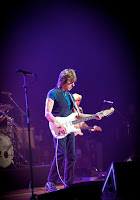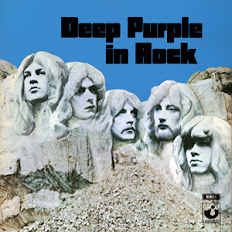Fans of contemporary short mystery fiction know that, over the last decade or so, there have been literally dozens of anthologies collecting crime fiction inspired by songs– usually those of a single artist or band, but sometimes a genre or specific era of music. In her column earlier this month, my fellow SleuthSayer Barb Goffman discussed her contribution to one of the most recent, IN TOO DEEP: CRIME FICTION INSPIRED BY THE SONGS OF GENESIS, edited by Adam Meyer (fair disclosure: I also have a story in this book). She shared a piece of valuable advice from another SleuthSayer, John Floyd, on how to write a story inspired by a song: not to get bogged down trying to work in every detail, but to find a piece of it to build on.
These musical anthologies started coming out at roughly the same time that I started publishing stories, and I've written for quite a few of them, so I thought I'd offer some of my own thoughts on the subject, in a scattered kind of way.
By way of credentials, I've written stories, for current or upcoming anthologies, based on songs by (deep breath) Roy Orbison, Johnny Cash, The Ramones, Pink Floyd, The Allman Brothers, Waylon Jennings, The Beatles, The Grateful Dead, Aerosmith, Dexys Midnight Runners, Lyle Lovett, Genesis, Timbuk3, and Elton John– plus, just to round things out, numbers from the musicals Grease, Do I Hear a Waltz?, and Spring Awakening. There's also an orphan to mention here: a story I quite liked based on a Eurythmics song, for a project that ended up being cancelled. I hope that one eventually sees the light of day somewhere.
The first inspired-by-music story I wrote was in response to Sandra Murphy's call for stories for PEACE, LOVE, AND CRIME: CRIME FICTION INSPIRED BY THE SONGS OF THE SIXTIES. Figuring that Sandy would be swamped by stories inspired by the Beatles, Bob Dylan, and the Beach Boys, I used a favorite song by a different artist, one I hoped nobody else would light on: Roy Orbison's "Oh, Pretty Woman." I guess writers aren't supposed to say things like this, but the resulting story, "Mercy," remains one of my personal favorites. It's a little unusual in that the lyrics do inspire specific scenes, but the record itself is also an object within the story. The central character is a young woman, Lila, whose brother is killed in Vietnam, after which their abusive father destroys his treasured record collection. The 45 of Orbison's song is the only survivor, and the story concerns what Lila is willing to do to preserve it and find her own freedom.

Most of my musical yarns take an approach much closer to what John advised Barb to do: find a few details in the song to hang a story on. Over time I've combined this with another way of thinking about the task at hand; instead of writing a story inspired by the song, I ask myself what series of events might have inspired someone to write the song. I'm not entirely sure why this seems to work for me, but it does.
As Barb noted, there can be special challenges in using a song that already has a fairly coherent narrative plot. Michael Bracken was kind enough to invite me to write the title story for his anthology JANIE'S GOT A GUN: CRIME FICTION INSPIRED BY THE MUSIC OF AEROSMITH. That song already has an explicit story embedded within it (and fleshed out in the music video, which helped to make the song a monster hit) about a girl who shoots her abusive father. I didn't want to simply retell the story, but it seemed silly to pretend it wasn't there, so I decided to make my version a kind of sequel, in which we find out what happens afterwards.

On the other end of the spectrum, many of the songs of the Grateful Dead are little more than collections of trippy images and seeming free association, allowing plenty of room for play. When I wrote a story inspired by their "The Music Never Stopped," for Josh Pachter's collection FRIEND OF THE DEVIL: CRIME FICTION INSPIRED BY THE SONGS OF THE GRATEFUL DEAD, I chose five or six of the most vivid lines and tried to weave them (or rather references to them, as, for legal reasons, these stories generally cannot quote lyrics directly) into a story about a couple of drug dealers drawn into an act of violence at, appropriately enough, a concert.

I find writing these musical stories to be enormously fun and satisfying, and I hope I get to do a lot more of them. They offer inspiration, but also constraint: you have to evoke the original song clearly enough to amuse and engage its fans (but without making use of actual lyrics!) and at the same time craft a story strong enough to satisfy readers who might not know the song at all. Some of the best art, I think, resides precisely at this intersection of boundless freedom and rigid guidelines.
It will be interesting to see how long the current fad for these collections will last. It might seem like there have been so many of them that the trend must be nearer its end than its beginning, but on the other hand there is a long list of artists who haven't yet had inspired-by anthologies (note: it's entirely possible that some of the folks I'm about to name have inspired books I'm not aware of; if so, please let me know). Off the top of my head, I'd love to see (and contribute to!) collections based on Tom Petty, Willie Nelson, U2, Madonna, REM, The Rolling Stones, Kinky Friedman, Carole King, Fleetwood Mac, Melissa Etheridge, The Indigo Girls, Aimee Mann, Taylor Swift, or John Prine.
I also can't help but notice that the vast majority of these anthologies (again, at least the ones I'm aware of) focus on white musicians. Maybe the single most glaring omission from the list of honored artists, given the sheer volume of his output and the incredible depth and richness of his lyrics, is Prince. Or how about a collection inspired by the hits of Motown? The blues giants of Chess Records? There are great stories just waiting to be written for "Papa Was A Rolling Stone" or "Mannish Boy."
I also can't be the only one who'd love to see crime writers taking on a comic musician. Bring on DARE TO BE STUPID: CRIME FICTION INSPIRED BY THE SONGS OF WEIRD AL! Bring on Spike Jonze and Spinal Tap! Bring on Dr. Teeth and the Electric Mayhem! And save me a slot on the table of contents!
 |
| Can you picture that? |
What acts do you hope to see honored with one of these volumes? And if you've written for some of them, how do you approach the songs?



























